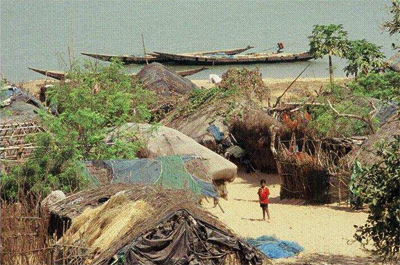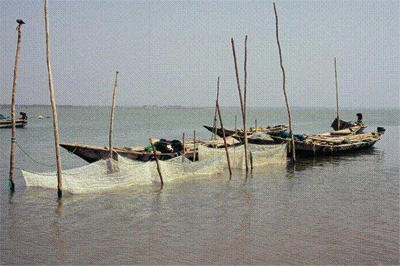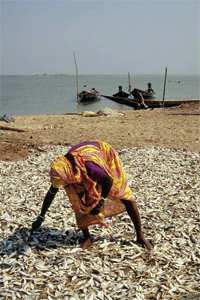Dhalabali :
Living on the Edge
By Ivan, Action Village India

Chilka, which in the monsoon has an area of 1100 sq km, is in reality a large lagoon as it has an opening to the sea which makes the water brackish. Ekta Parishad is working with struggling fishing communities in 28 villages whose livelihoods have been devastated by a range of factors. For example, in recent years there has been an expansion in prawn cultivation which has restricted the area where fishing can take place. Similarly, he government of Orissa has expanded a bird sanctuary leading to the same consequences. However, the greatest problem for these communities was the opening of a new sea mouth for the lake in 1999 by the Chilka Development Authority. This was done because the old ‘natural’ sea mouth near the northern end of the lake was silting up as was the lake itself. However, the impact on these 28 villages around the two sea mouths has been disastrous. The flow of water past the villages has changed as has the salinity level. These changes in the ecology of the lake have combined to reduce fish populations and consequently devastated incomes.
In February 2009 Action Village India’s Coordinator and three supporters spent five days on the lake with Ekta Parishad’s activists. Our first afternoon was spent at a meeting of women from fishing communities in Sorana where we also paid our respects at the memorial to the five martyrs who were shot dead by police on the lake whilst destroying illegal prawn nets.

One visit that stands out in the memory was the journey across the lake to Dhalabali, a village of 500 families of the Noila fishing community. They all live in bamboo and coconut thatch huts on the sand dunes separating the lake from the Bay of Bengal. They traditionally fish from small boats in the Bay of Bengal, so this site near the new sea mouth is ideal for them, though very dangerous in the face of cyclones which regularly sweep over this coast.
The village has no electricity, no school; no health services and very little ‘sweet water’ and what water is available is found in very shallow pits dug on the edge of the village. Some of AVI’s grant has been used to buy concrete rings to stabilise the pits where people bathe as well as collect drinking water. The reason why this village has no services is that this is Forestry Department land, so the people have no right to live here unless they can claim for homestead land under the Forest Rights Act, 2007.
During our tour of the village we were taken to a school run by an Ekta volunteer. We stepped into one of the larger huts and sat in one room. We heard that the nearest school is across the lake and as people do not have enough money to pay for small boats to ferry the children across, none of the children go to school. In response to demands from the parents, Ekta decided to support a village school. A family offered their home as a school, but on the condition that when they came back from fishing they could have it back and the school would have to decamp under the nearest tree.
After our meeting, the children were allowed out of the small windowless back room, they raced past us, faces full of joy and excitement all clutching their exercise books, maybe 40 children being taught in two room no bigger than 20’ by 8’. Community leaders told us that they would build the walls and do all the labouring to build a school, if someone would fund the bamboo poles and the thatched roof. Later we agreed to this request and at the same time, the Ekta activists will be seeking to get these neglected children their right to education under the Government of India’s Sarva Shikshan Abhiyan (Education for All) programme.

At the end of our visit we were told of two recent Ekta Parishad actions which had increased their standing in the area. Firstly they had organised people in a successful protest against the proposals by the Chilka Development Authority for a dolphin sanctuary for the Irrawaddy dolphins. The other success was to broker peace between Gabakunda and another village over access to the lake. Both villages were arming themselves with guns and home made bombs. The police were stationed in the area but could not stop the rising tension, but over a period of time, Ekta managed to broker a peace deal.
Working with these traditional fishing communities to ensure that their needs are taken into account when decisions are being made on the development of the lake is a big task. Action Village India supports programmes in six states of India and this is undoubtedly one of the toughest areas and we can only feel admiration for those who are working in such difficult conditions.
– By Ivan, Action Village India
| More information : Clic here. |




